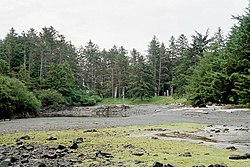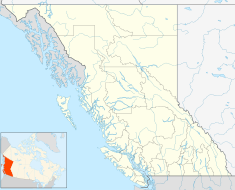Ninstints
| Ninstints | |
|---|---|
| S'G̱ang Gwaay Llanagaay | |

A former Haida village at the site
|
|
| Location | Haida Gwaii, North Coast of British Columbia, Canada |
| Coordinates | 52°05′56″N 131°13′03″W / 52.098889°N 131.2175°WCoordinates: 52°05′56″N 131°13′03″W / 52.098889°N 131.2175°W |
| Official name: Nan Sdins National Historic Site of Canada | |
| Designated | 1981 |
| Official name: SG̱ang Gwaay | |
| Type | Cultural |
| Criteria | iii |
| Designated | 1981 (5th session) |
| Reference no. | 157 |
| State Party | Canada |
| Region | Europe and North America |
Ninstints is the usual name in English for S'G̱ang Gwaay Llanagaay ("Red Cod Island"), a village site of the Haida people and part of the Gwaii Haanas National Park Reserve and Haida Heritage Site in Haida Gwaii on the North Coast of British Columbia, Canada.
The village site is a World Heritage Site, and a National Historic Site of Canada.
The name of the village site is also spelled Nan Sdins and also called Skungwai or S'G̱ang Gwaay, which is the Haida name for Anthony Island, where the village is located and means "Red Cod Island". During the late 18th and early 19th centuries the village was referred to as Koyahs or Coyahs, also rendered Quee-ah, after the chief at the time, Koyah. The name "Ninstints", also spelled "Nan Sdins," was the name of the most powerful of the village's chiefs in the mid-19th century and came to be used as the village's name as a result of the practice of ship captains to refer to villages by the name of the headman or chief at the location.
The village was the southernmost of Haida villages, being just west of and facing Kunghit Island, the southernmost island in the archipelago. Ninstints today features the largest collection of Haida totem poles in their original locations, many celebrated as great works of art, though they are being allowed to succumb to the natural decay of the lush temperate rainforest climate. Images of the ruins of Ninstints are emblematic of Haida culture and of the Queen Charlotte Islands and are featured in tourism promotions for the islands and the province at large. The site is extremely remote, and access is only by sea or air from towns in the northern part of the islands. One of the chiefs, named Ninstints, whose English name was Thomas Price, was a noted and highly artistic carver of Haida art, notably in Haida Argillite Carvings.
...
Wikipedia

